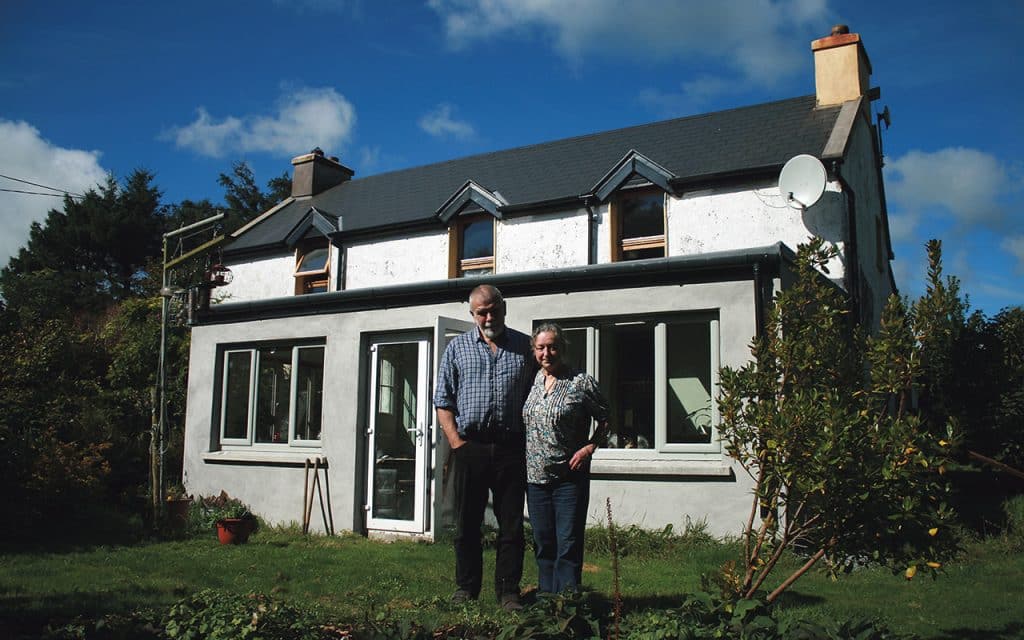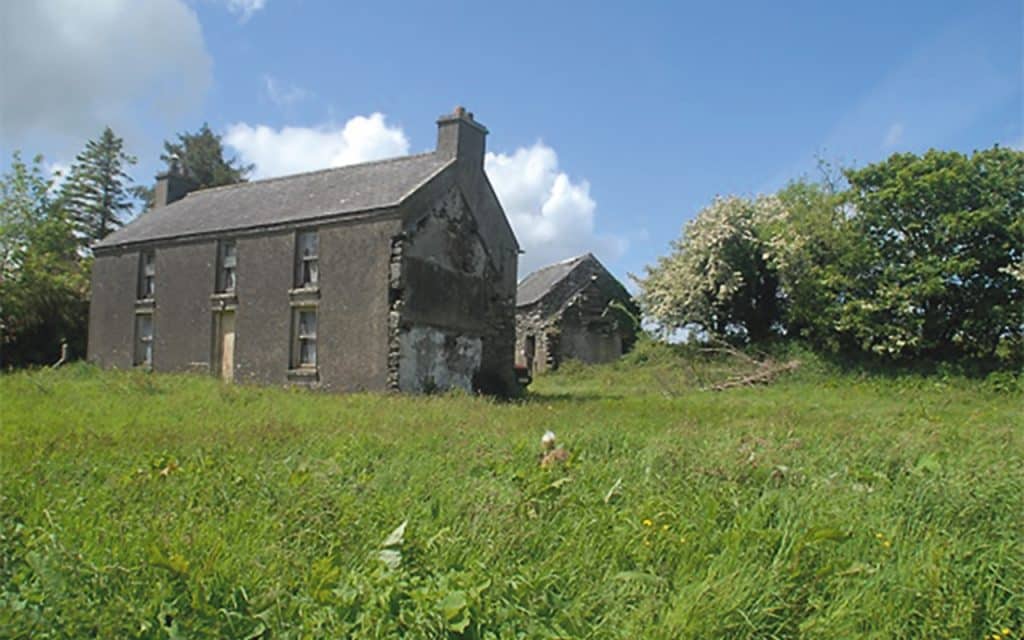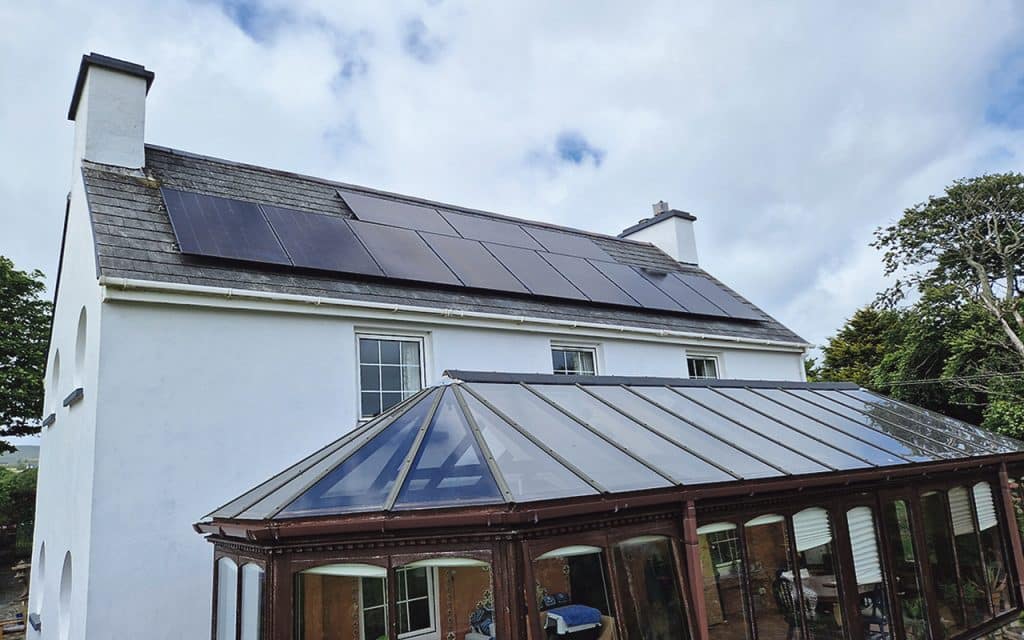
In 2011, Sue and Robin Lewando embarked on a journey many would hesitate to take. Tired of the daily grind and unable to secure a mortgage in England, they ventured to West Cork with the hope of turning a derelict cottage into their dream home. “We had both visited Ireland separately in our younger years,” Sue explains. Drawn by their love of music and the countryside, the couple found themselves returning frequently, especially after Robin’s son moved to Ireland in 2004. But it wasn’t just family that pulled them to West Cork — it was a chance to live mortgage-free.
At the time, Sue and Robin were trying to purchase a home in the UK but found that due to their age — both in their 50s — they couldn’t secure the financing they needed. What they did have, however, was a substantial deposit and a desire for change. “With the amount of money we had, we could buy a wreck outright,” says Sue, and that’s exactly what they did.
The cottage that Robin and Sue purchased had been vacant for 30 years. Set on 2.5 acres of land in Rearahinagh near Skibbereen, it was more of a shell than a home. Built from local field stone and earth, with thick “battered” walls typical of old Cork farmhouses, it had two rooms downstairs and three upstairs, but little else. The windows had fallen out, the roof was porous, and there were no modern amenities — no plumbing, no electricity, and certainly no insulation. But it had one major thing going for it: a roof. Although the roof needed work, it had been redone 30 to 40 years earlier, giving Sue and Robin hope that they could save it.
The couple moved onto the site in an old Bedford bus while they began the daunting task of making the house liveable. “We lived outside in the bus for six months,” Sue recalls, “and the first thing we did was put one window in the little front room so we’d have somewhere to go in the winter.”

Neither Sue nor Robin had formal building experience, but this didn’t deter them. Robin’s farming background and their shared work in the UK as energy assessors had given them a basic understanding of building regulations and construction techniques. Still in many ways, they were flying blind, relying on the help of neighbours and a local builder who offered advice. “We learned a lot as we went,” says Sue. “The man down the road, a builder, would come up and say, ‘I wouldn’t have done it quite like that,’ but he was very helpful.”
The renovation was a labour of love, but it was also a steep learning curve with Robin and Sue doing most of the work themselves, from digging out the septic tank to installing windows they bought second-hand. “One window at a time,” Sue laughs. “We had to lower the sills and take out the lintels to fit some of them in, but we made it work.”
Over the years, the roof was fully repaired and new plumbing was installed with the help of a neighbour’s plumber in exchange for Robin’s help with milking cows. They also added an extension to the back of the house, turning a collapsing lean-to into a bright and functional living space and most recently installed PV cells.
Though they’ve invested thousands into the renovation, Sue isn’t sure exactly how much they’ve spent. “I’ve kept all the receipts,” she admits, “but I haven’t totalled it up yet.” What she does know is that they’ve transformed a near-ruin into a cozy, character-filled home.
While their home was taking shape, so too was Sue’s writing career. After years of self-publishing thrillers under the pseudonym Chris Lewando, she achieved a significant breakthrough in 2023 when Bookouture, a subsidiary of Hachette, offered her a three-book deal. Writing under the new pen name Daisy O’Shea, Sue’s Emerald Isle series — set in 1970s Ireland — has resonated with readers. Her first two books in the series reached the top spots in Amazon’s Irish Historical Fiction category, and her third book is eagerly anticipated with over 2,500 pre-orders ahead of its October 2024 release.
The Emerald Isle series features dual timelines, weaving together present-day relationships and past mysteries, with the fictional Roone Bay on the West Cork coast as the central setting. Sue’s books explore Irish issues from the 1970s and breathe life into the landscape and history she and Robin now call home.
Sue’s success as an author came as a welcome surprise after decades of trying to break into the industry. “After a lifetime of trying to wedge a foot through the publishing door, it finally opened,” she says with a smile. Already, the series has sold nearly 20,000 copies, and subsidiary rights have been sold for audiobooks and foreign editions in Norway, Denmark and the Czech Republic. “It’s been an amazing journey,” she reflects, “and I’m so glad it’s finally happening.”
For Sue and Robin, their adventure in West Cork has been about more than just renovating a house. They’ve embraced a simpler, slower pace of life, raising sheep and pigs for a time, and even bartering homegrown produce and pork for building materials. “We never intended to be farmers,” Sue notes, “but it was an adventure.” Now, with the house largely completed, they can enjoy the fruits of their hard work. Robin continues his studies in Irish landscape development since the Ice age (he is now doing a PhD in UCC), while Sue writes fulltime, enjoying the peace and beauty of the home they’ve built together.



